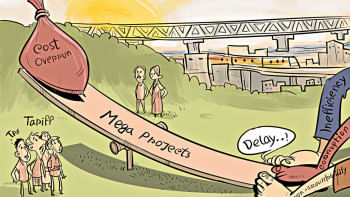Are ministers not complicit in time, cost overruns?

In an interview published in The Daily Star on April 1, former Planning Minister MA Mannan put the blame for cost and time overruns in development projects squarely on the shoulders of bureaucrats. In so doing, the former planning minister effectively absolved his political colleagues and the policymakers from any wrongdoing. Mannan himself has been a civil servant for about three decades, and a member of parliament for 15 years. During that time, he spent 10 years as a member of the cabinet—first as the state minister for planning for five years and then as the planning minister for five more.
In this lengthy interview, the lawmaker from Sunamganj-3 constituency identified his former civil servant colleagues as the only offenders for cost and time overruns in development projects, while his current political colleagues as victims of bureaucratic machinations.
Mannan is widely respected as an honest and diligent person. It is expected that someone with the healthy mixture of being both a bureaucrat and subsequently a politician, and a cabinet minister, should know better where lies the fault lines for the massive drainage of the nation's precious resources in planning, drawing up, approval and the eventual execution of a development project. Added to that is the huge suffering this brings to the general public, who are the innocent end users. The former planning minister has chosen to single out engineers and project directors as being among the offenders. In the interview, he spoke at length about faulty project designs, unnecessary public expenditure, slow project implementation, and lack of accountability of project directors and engineers, among other systemic faults and outdated bureaucratic methods, as the reasons for the ill health of project implementation.
He may be right, but only up to a point.
Public representatives, more so a cabinet minister, should have the honesty and integrity to admit his or her own failures and accept the blame, not just pass them on to those salaried employees involved at the secretarial and technical levels.
As a former bureaucrat myself, I am somewhat aware of the entire process that a project proposal needs to go through before its final approval at the Ecnec. If I recall right, development project proposals, especially those that are connected to infrastructure development involving huge monetary outlay, are supposed to be first put under a microscope by the concerned or implementing ministry at the level of the relevant minister, then further examined and cross-examined at inter-ministerial meetings mostly headed by cabinet ministers. The proposal is then presented before the Cabinet Committee on Economic Affairs, usually headed by the finance minister, where it is further discussed threadbare before it is presented at the Ecnec, a body headed by the prime minister, for further examination and final decision. Here, too, the feasibility of the project and the benefits it might accrue for the general public are expected to be discussed in detail. Once the project is approved, it falls on the relevant ministry to execute it within the approved budget and the given timeframe.
From what has been stated above, it should be abundantly clear that it is the policymakers at the ministerial level who are responsible for ensuring the timely execution of development projects and avoiding cost overruns through proper oversight and seeking accountability of those at the field levels.
To cite a glaring example of poor governance, the late Dr Jamilur Reza Chowdhury, undoubtedly one of brightest engineers of our time and an important player in the hugely successful implementation of Padma Bridge, once described the Bus Rapid Transit (BRT) project (Hazrat Shahjalal International Airport to Joydebpur) as one of the most ill-conceived, ill-planned, financially wasteful infrastructure projects ever undertaken in Bangladesh. He said there were much better, less expensive and far less time-consuming alternatives available. Experience shows that the famed engineer was absolutely right. The much-talked-about BRT project seems to be on a never-ending path, and if and when it is finally completed, how much of a real benefit it will bring to the public remains to be seen. Even the technical people involved with the project work tend to echo this view. There are many other projects that can be cited as cases in point.
In such a scenario, is it fair to blame only bureaucrats and engineers for this sorry state? What about the ministerial-level routine oversight and seeking accountability at every stage of implementation? Would failure to do so not make the ministers complicit? Then why singularly blame bureaucrats and project directors, especially those who want to earn an honest living, for cost and time overruns? Public representatives, more so a cabinet minister, should have the honesty and integrity to admit his or her own failures and accept the blame, not just pass them on to those salaried employees involved at the secretarial and technical levels.
In the interview, Mannan said, "Every single bureaucratic tier thinks of themselves as independents, or want to do their work independently." He claimed this phenomenon as "the reason why work gets delayed." To me, this judgement is an admission of one's own failure; it is also gravely wrong, if not unethical. Such a comment from a responsible public representative smacks of nothing but abysmally poor governance, and poor governance alone.
MA Mannan has also suggested a series of dynamic and innovative changes in the system to make the whole process more time- and cost-efficient. He should be lauded for this, even if they have come too little, too late. Perhaps the right time to push for them would have been when he was a member of the cabinet, not now when he is not part of it. Creative as they may be, one hopes his prescriptions for change do not remain a pipe dream.
Shamsher M Chowdhury, Bir Bikram, is a former foreign secretary of Bangladesh and president of Trinamool BNP.
Views expressed in this article are the author's own.
Follow The Daily Star Opinion on Facebook for the latest opinions, commentaries and analyses by experts and professionals. To contribute your article or letter to The Daily Star Opinion, see our guidelines for submission.


 For all latest news, follow The Daily Star's Google News channel.
For all latest news, follow The Daily Star's Google News channel. 










Comments